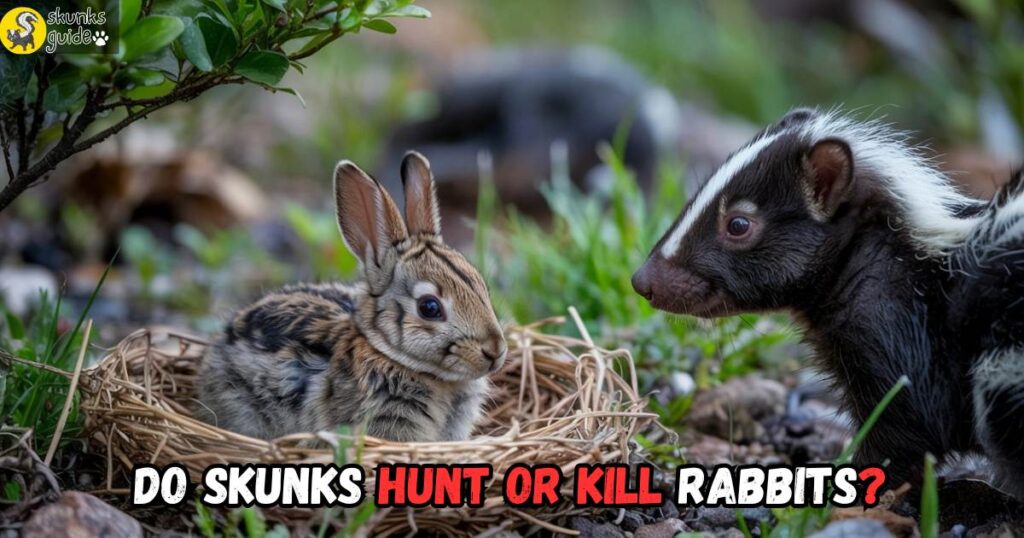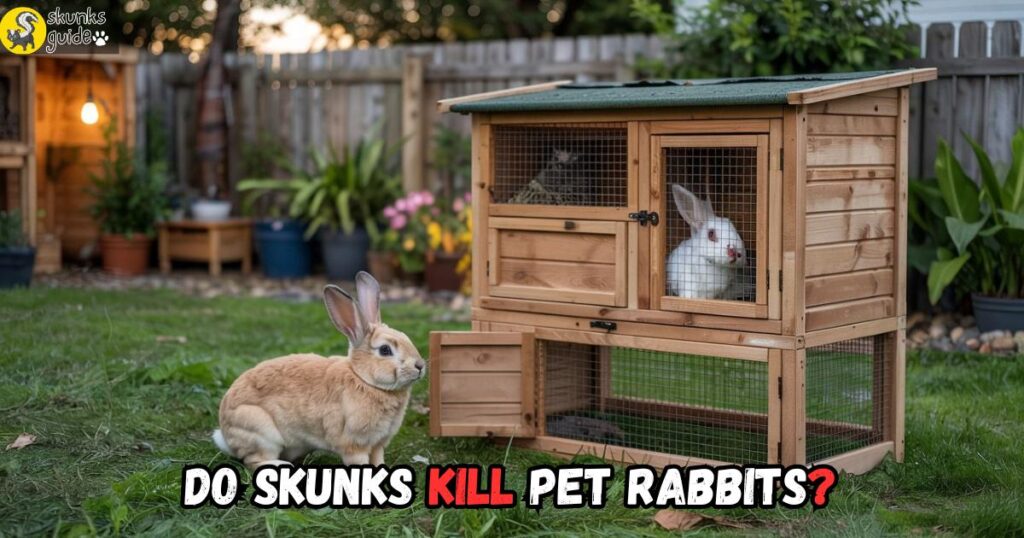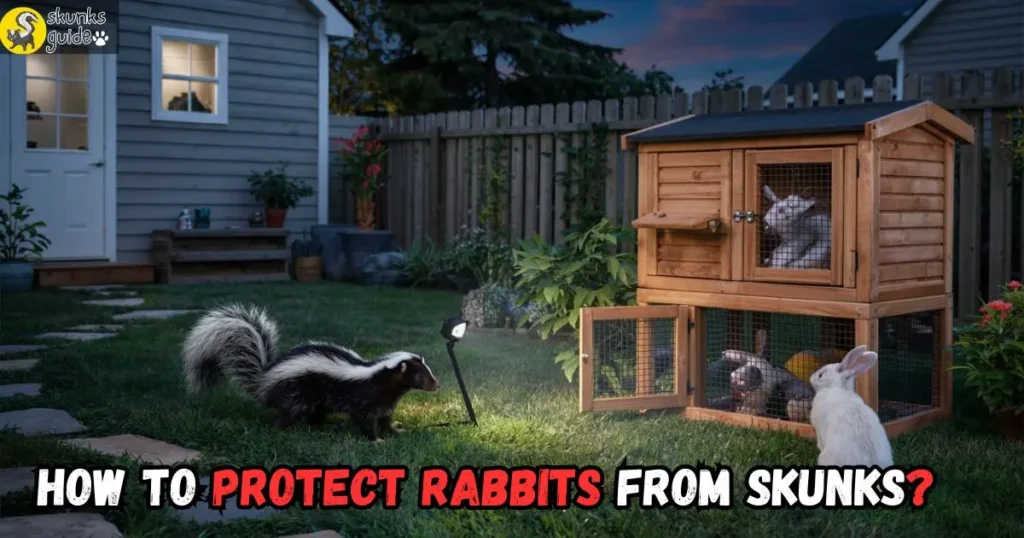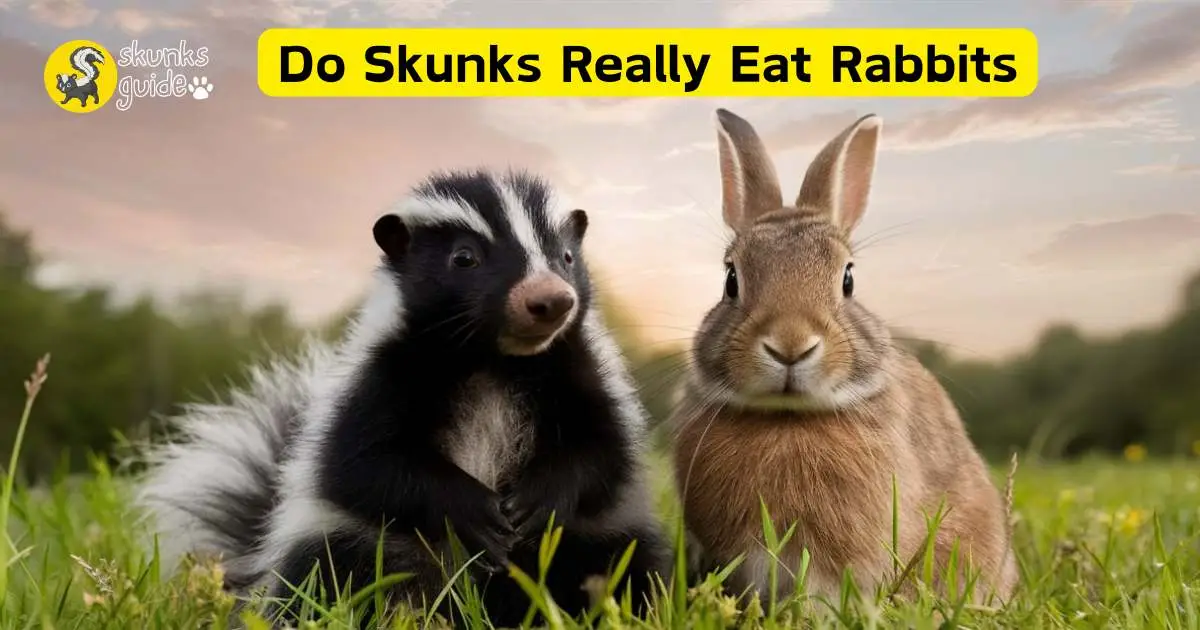Do Skunks Eat Rabbits? The Surprising Truth
Last updated on June 15th, 2025 at 11:34 pm
Yes, skunks may eat rabbits—especially baby ones. While they don’t actively hunt adult rabbits, they will kill or eat baby rabbits (kits) if they find them in ground nests or injured. Skunks are opportunistic feeders, not predators built for the chase.
As an animal expert who’s tracked predator-prey interactions in suburban and rural areas, I’ve seen firsthand that skunks kill baby rabbits more often than people think—mainly at night when the mother rabbit isn’t present.
What Time Do Skunks Eat Rabbits?
Skunks are nocturnal, so they hunt or scavenge primarily at night. If they come across a rabbit nest after dusk:
- They may kill baby rabbits (kits)
- They will scavenge a dead or injured rabbit
- They’re more active in spring/summer, when rabbit kits are born
🌙 Fact: Most ground-nesting baby rabbit deaths by skunks occur between 10 PM and 4 AM—when nests are unguarded.
Factors Influencing Skunk Diet Choices
Skunks are opportunistic feeders. Their diet varies based on several factors. Understanding these factors helps us know what skunks eat.
Food Availability
Skunks eat different foods depending on what’s available. They are not picky eaters. Their diet includes:
- Fruits: Berries, apples, and grapes.
- Insects: Beetles, grasshoppers, and ants.
- Small Animals: Mice and rabbits.
- Plants: Roots and leaves.
Urban areas provide more food sources. Skunks often scavenge in garbage. They also hunt for small animals. Food availability greatly influences their choices.
Seasonal Dietary Changes
Seasons affect skunk diets significantly. In spring and summer, skunks eat more insects. They rely on the abundance of:
| Season | Common Foods |
|---|---|
| Spring | Insects, young plants, eggs |
| Summer | Fruits, insects, small mammals |
| Fall | Nuts, berries, small animals |
| Winter | Roots, frozen fruits, scavenged food |
During fall, skunks gather food for winter. They eat nuts and berries. In winter, they eat stored food or scavenge. Seasonal changes shape their diet choices.
Do Skunks Hunt or Kill Rabbits?

Let’s break this down:
| Question | Answer | Notes |
|---|---|---|
| Do skunks hunt rabbits? | ❌ Not usually | They don’t chase adult prey |
| Do skunks kill rabbits? | ✅ Yes (if baby/injured) | Opportunistic killing |
| Would a skunk kill a rabbit? | ✅ Yes | If the rabbit is small, trapped, or weak |
| Do skunks kill baby rabbits? | ✅ Definitely | Most common rabbit-related behavior |
How Rabbits Evade Predators
Rabbits face many dangers in the wild. Skunks are one of their potential predators. To survive, rabbits use smart strategies. They have developed effective ways to stay safe.
Survival Strategies
Rabbits rely on several survival strategies to avoid predators like skunks:
- Camouflage: Their fur blends with the environment.
- Speed: Rabbits can run fast to escape threats.
- Burrowing: They dig holes to hide from predators.
- Alertness: They have keen senses to detect danger.
Rabbit Defenses Against Skunks
Rabbits have unique defenses against skunks:
- Quick Hops: They can quickly change direction.
- Thumping: They thump their feet to warn others.
- Group Living: They stay in groups for safety.
- Nocturnal Behavior: Many rabbits are active at night.
| Defense Mechanism | Description |
|---|---|
| Camouflage | Fur color matches surroundings. |
| Speed | Can run up to 35 mph. |
| Burrowing | Creates tunnels for hiding. |
| Alertness | Sharp senses to spot threats. |
These protective measures help rabbits survive against skunks. Their instincts and abilities keep them one step ahead of danger.
🐾 Why Do Skunks Eat Rabbits?
Skunks are not specialized hunters like foxes or coyotes. But they will:
- Kill baby rabbits if they find a nest
- Eat injured or dead rabbits
- Dig up nests in search of eggs or grubs, accidentally discovering kits
They don’t chase prey but take advantage of what’s easy, slow, or defenseless.
🏡 Do Skunks Kill Pet Rabbits?

They can if:
- The pet rabbit is left outside overnight
- The hutch is not fully enclosed
- The rabbit is very young or ill
🔒 Pro Tip: Keep pet rabbits in a secure, raised hutch with a bottom barrier or hardware cloth. Skunks are poor climbers, but they dig very well.
🌱 How to Protect Rabbits from Skunks

If you raise rabbits or care for wild ones:
Use motion lights or natural deterrents (citrus, vinegar spray)hy ecosystems benefit both skunks and rabbits.
Cover wild nests with twigs (you’ll know if skunks disturb them)
Secure hutches with ½” mesh hardware cloth
Bring pet rabbits indoors after sunset
Clear fallen fruit or pet food that attracts skunks
Frequently Asked Questions
Do Skunks And Rabbits Get Along?
Skunks and rabbits typically do not get along. Skunks are predators and may see rabbits as prey. While they might coexist in the wild, interactions can be tense. It’s best to keep them separated in domestic settings to ensure the safety of both animals.
What Attracts A Skunk To Your Yard?
Skunks are attracted to yards by food sources like pet food, garbage, and fallen fruit. Dense vegetation offers shelter and nesting spots. Water sources, such as ponds or bird baths, also draw them in. Keeping your yard clean and well-maintained can help deter these curious creatures.
What Is The Only Animal That Will Eat A Skunk?
The only animal known to eat skunks is the great horned owl. This predator can tolerate the skunk’s strong odor and is skilled at hunting them. Great horned owls primarily hunt at night, making them effective skunk hunters in their natural habitat.
Conclusion
Skunks primarily feed on insects, fruits, and small rodents. While they can eat rabbits, it’s not their main diet. Understanding skunk behavior helps manage interactions with them. Protecting your garden and pets is essential. Awareness of local wildlife can prevent potential conflicts and ensure a harmonious coexistence.

